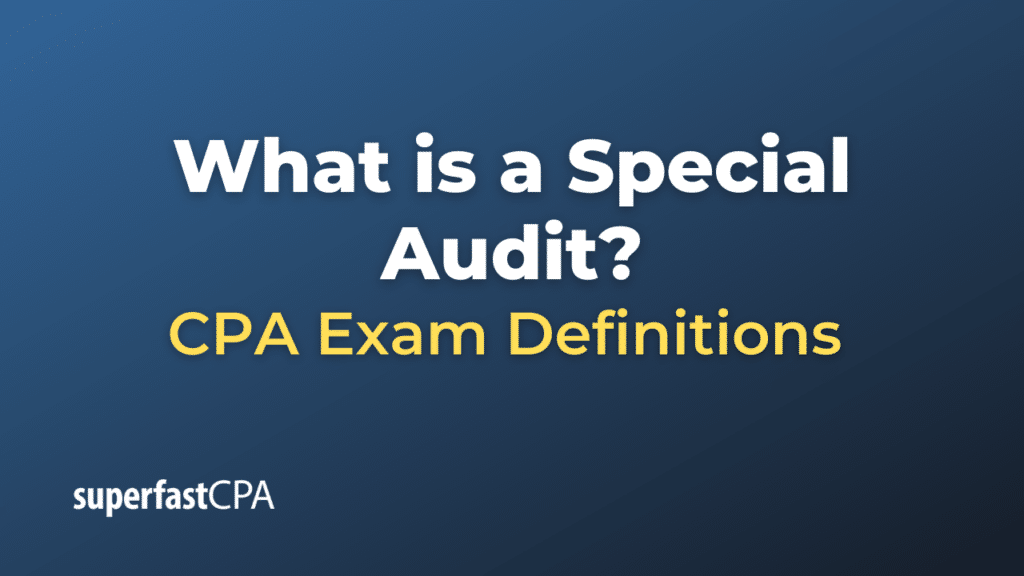Special Audit
A special audit, often referred to as a forensic audit, is an examination of a specific area or aspect of an organization’s finances, operations, or systems, usually conducted in response to a particular concern or suspicion. Unlike regular financial audits that provide an opinion on the overall financial statements of an entity, special audits focus on specific issues or areas.
The purpose of a special audit can vary widely, but often they are conducted:
- To Investigate Fraud or Misappropriation: If there’s suspicion of financial irregularities, embezzlement, or other fraudulent activities, a special audit can be initiated to uncover any wrongdoing.
- To Ensure Compliance: An organization might require a special audit to ensure it’s adhering to specific regulations, standards, or contractual obligations.
- In Response to a Specific Request: Sometimes, external parties (e.g., regulatory agencies, partners, or major shareholders) might request an in-depth examination of a specific aspect of an organization.
- Due Diligence: In mergers and acquisitions, a special audit might be performed on specific parts of a target company’s operations or finances to ensure there are no hidden liabilities.
- To Review Internal Controls: A company might want a deep dive into its internal controls in a particular area to ensure they’re robust and effective.
- To Validate or Refute Claims: If there are claims made either by insiders (like whistleblowers) or external parties against the organization, a special audit can help in validating or refuting those claims.
Special audits are typically conducted by experts in the field of the audit’s focus, which can be internal auditors of the organization or external specialists, such as forensic accountants.
The result of a special audit is a detailed report that addresses the specific scope of the audit, presents findings, provides evidence, and may offer recommendations.
Example of a Special Audit
Let’s consider a hypothetical scenario to illustrate a special audit.
Scenario: XYZ Pharmaceuticals
XYZ Pharmaceuticals is a company that develops and markets specialized drugs. A whistleblower within the company sends an anonymous tip to the board of directors, alleging that the company’s senior management has been inflating drug trial success rates to boost stock prices.
Concerned about these allegations and the potential repercussions for the company and its stakeholders, the board decides to commission a special audit.
Purpose of the Special Audit: To investigate the veracity of the claims made by the whistleblower and determine if the company’s drug trial results have been misrepresented.
Steps:
- Selecting the Audit Team: The board hires an external firm with expertise in forensic accounting and experience in the pharmaceutical industry. This ensures an unbiased and thorough examination.
- Defining the Scope: The scope of the audit is defined to focus on:
- Drug trial results reported in the last three years.
- Comparing reported results with raw trial data.
- Interviews with key personnel involved in the trials and reporting process.
- Examination of communication (like emails) between senior management regarding the drug trials.
- Gathering Evidence: The audit team begins by collecting all the reports, raw data, and relevant communications. They conduct interviews with the research teams, data analysts, and members of the management.
- Analysis: The audit team finds discrepancies between the raw data and the reported results for two major drugs. Further, some email communications hint at deliberate manipulation of data before public release.
- Reporting: The audit team prepares a comprehensive report detailing their findings. The report confirms that there were instances of data inflation and identifies the individuals involved. Recommendations include taking appropriate action against those involved, re-evaluating the affected drug trials, and implementing stricter internal controls.
- Action: Based on the audit findings, XYZ Pharmaceuticals takes corrective measures, which include restating their drug trial results, taking disciplinary actions against the involved parties, and implementing more stringent review processes for future trials.
In this example, the special audit was crucial in uncovering malpractices within the company. By addressing the issue proactively, the company could potentially prevent larger issues in the future, such as regulatory penalties, lawsuits, or a significant loss of trust from stakeholders.













